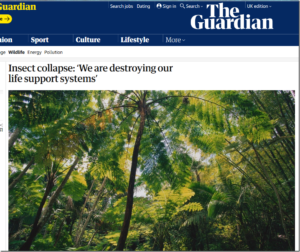by P. Homewood, January 20, 2019 in NotaLotofPeople KnowThat
…
Clearly the whole study is worthless, and the paper should be withdrawn.
There are some alarming facts about all of this:
1) Why did the researchers not suspect that the temperature data looked hopelessly wrong at the outset?
2) Why did peer review not do the basic checks that I did?
3) The study carries out some mindbendingly complex statistical analysis, linking arthropod decline to rising temperatures. But how can this analysis have been robust, when the temperature data was hopelessly wrong?
The conclusion is that the faulty temperature data matched the researchers’ expectations of climate warming, and consequently they never bothered to crosscheck. It would after all have been extremely simple to have asked the people who maintain the data.
Whether or not arthropods are in decline I have no idea. But by blaming non existent climate warming, there is a very real danger that the true cause is being missed. Indeed, looking at those graphs, it may well be climate cooling that is responsible.
I plan to contact PNAS, who published the paper, to request that it be withdrawn.
…

by David Middleton, January 18, 2019 in WUWT
“The Anthropocene as a geological epoch is not formally recognized”… So… “The term Anthropocene has” NOT “been widely used for the current period in Earth’s geological history“. It may be frequently used by activists and scientists who are ignorant of basic geology, but geologically speaking the term “Anthropocene” does not exist in any relationship to any period, epoch, age, era or eon in Earth’s geological history.
..

Yes, we have no Anthropocene, we have no Anthropocene today… Sung to the tune of Yes, We Have No Bananas.
by Press Release, GWPF, December 20, 2018
London, 20 December: One of Europe’s most eminent climate scientists has documented the main scientific reasons why the recent UN climate summit failed to welcome the IPCC’s report on global warming of 1.5°C.
In a paper published today by the Global Warming Policy Foundation Professor Ray Bates of University College Dublin explains the main reasons for the significant controversy about the latest IPCC report within the international community.
The IPCC’s Special Report on a Global Warming of 1.5°C (SR1.5) was released by the Intergovernmental Panel on Climate Change (IPCC) in advance of the recent COP24 meeting in Katowice, Poland, but was not adopted by the meeting due to objections by a number of governments.
Professor Bates examines some key aspects of the SR1.5 report. He assesses if the IPCC report exhibits a level of scientific rigour commensurate with the scale of its extremely costly and highly disruptive recommendation that carbon emissions be reduced to zero by mid-century.
The paper concludes that such a level of scientific rigour is not present in the report. Specifically, SR1.5 is deficient in scientific rigour in the following respects:
…
by Presse Release, GWPF, December 12, 2018
For all its green talk, China is sticking to fossil fuels
London, 12 December – While leaders of western countries fret about their greenhouse gas emissions in Katowice, China is forging ahead with new projects and investments in coal and gas. According to a new paper from the Global Warming Foundation (GWPF), the Communist Party’s survival depends on delivering economic growth and cleaner air.
…
La géologie, une science plus que passionnante … et diverse


